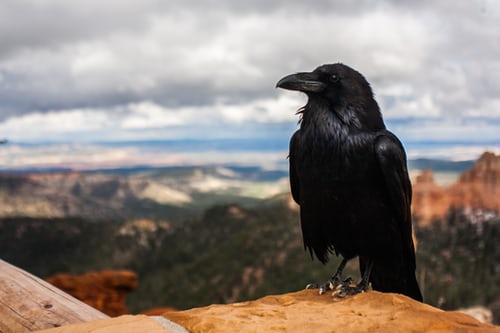A Reflection on 1 Kings 17:1-7 for Sunday, July 5 at Mosaic Baptist Church

Now Elijah the Tishbite, of Tishbe in Gilead, said to Ahab, ‘As the Lord the God of Israel lives, before whom I stand, there shall be neither dew nor rain these years, except by my word.’ The word of the Lord came to him, saying, ‘Go from here and turn eastwards, and hide yourself by the Wadi Cherith, which is east of the Jordan. You shall drink from the wadi, and I have commanded the ravens to feed you there.’ So he went and did according to the word of the Lord; he went and lived by the Wadi Cherith, which is east of the Jordan. The ravens brought him bread and meat in the morning, and bread and meat in the evening; and he drank from the wadi. But after a while the wadi dried up, because there was no rain in the land.
It is a tough way to be trained: confront the king with a coming drought then hide in the wilderness dependant on the good-will of the birds.
The first half of 1 Kings focused on King Solomon. He, like Elijah, was trained in the ways of YHWH. Both Solomon and Elijah were to be God’s representative to Israel – and the world.
Everything, however, seemed to come so easily to Solomon. After his dream and request for wisdom abundant riches and power are also freely given and unrequested.
The second half of 1 Kings Reads as though God is trying a new strategy. The privileged kings move further into the background and the narrative focuses more on the prophet Elijah.
In stark contrast to Solomon, Elijah’s training seems much harsher. He is no king. Palaces and the riches of the world remain unknown to him. He will never dress in the finest of silks and dine with the kings and queens of the world. In our passage we learn the Elijah is from a small town in Gilead named Tishbe. It’s location is now unknown. Tishbe is a nowhere place.
Yet from being a no one, Elijah is called to confront the king. God has given him bad news for King Ahab – drought will ravage his kingdom. Perhaps, with a start like this, it is no surprise that Ahab quickly learned to dislike – and avoid – Elijah’s God-given messages.
Of course, drought is not only a challenge for Ahab. It is a genuine threat for all who live in the land. Including Elijah. How will this fledgling prophet survive? What will Elijah eat and drink?
Not in palaces with armies of servants bringing the prime produce of the land!
Rather, Elijah will go into the wilderness. God will provide only enough. A small stream to drink from. Bread and water each morning and evening. Birds will be his waiters.
Clearly God is not taking the same risk with Elijah as he did with Solomon. There God gave plenty. Now only enough.
Enough. In the modern western world we seem to never have enough. Even with more than any generation before us, we hold to a scarcity mentality. We want more. More money. More time. More holidays. More Acknowledgment and prestige.
Elijah’s call will be to confront kings. It will not, however, be from a place of worldly abundance and security. Rather, this voice will call from wild places – places where the provision of God is enough.
Conversation Starters:
Do you feel that you operate form a place of scarcity or enough?
What challenges did Solomon face with his abundance that Elijah did not? What challenges did Elijah face in his dependence that Solomon did not?
In what ways are both Solomon and Elijah both entirely dependent on God?
Who do you identify with most closely – Solomon or Elijah?